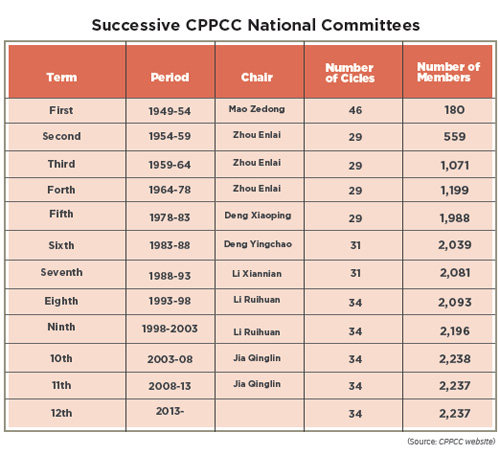|
For instance, in 1954, one circle represented farmers in agricultural collectives. In 1978, as the country began to implement the reform and opening-up policy, farmland was contracted to individual farmers and the circle was removed, while one representing sports and athletics was created. At the First Session of the Eighth CPPCC National Committee convened in 1988, a circle comprising economists and business people was added to reflect the country's emphasis on economic development.
More changes are necessary in the future, said Chen Jiping, Executive Vice President of the China Law Society. He suggested that a circle for legal experts should be added.
Role and reform
The CPPCC serves as a key mechanism for multi-party cooperation and political consultation under the leadership of the CPC.
In September 1949, the First Session of the CPPCC National Committee was held in Beijing. It adopted the Common Program of the CPPCC, which served as a provisional constitution of the People's Republic of China, and created the central people's government.
Before the NPC was established in 1954, the CPPCC National Committee had served as the de facto legislature of the country.
Over the past decades, the CPPCC's role in the country's political affairs has become increasingly important.
Since assuming posts in March 2008, members of the 11th CPPCC National Committee had put forward 28,930 proposals.
A number of proposals, such as those on reducing vehicle exhaust and improving conservation of grasslands and the rural environment, were adopted by the government into policies.
Such proposals as those on the reform of public hospitals, the national system of basic medicines and holiday-season highway toll exemptions have contributed to improving people's livelihood and social progress.
Members of the 11th CPPCC National Committee also had helped push the legislature to adopt the Mental Health Law, revise the Personal Income Tax Law and write drunk driving into the Criminal Law.
While some members have fulfilled their obligations as political advisors, other members, particularly sports and entertainment celebrities, have been questioned for their competence.
Liu Xiang, who won gold in the men's 110-meter hurdles final at the 2004 Athens Olympics, triggered controversy for asking for leave from four of the five annual sessions of the 11th CPPCC National Committee, of which he was a member.
Liu's excuses were either to compete abroad or to train for upcoming games. In 2011, the only year that Liu participated in the entire annual session of the CPPCC National Committee, he did not put forward any proposals.
Critics argue that now that CPPCC members such as Liu do not have time to serve as political advisors, the chance should be given to people who are more able to do so.
Earlier this year, Hong Kong movie director Stephen Chow's absence from the six-day annual full session of the CPPCC Committee of Guangzhou, south China's Guangdong Province, again fueled debate on a celebrity-cum-political advisor's role. Local media said that Chow, who was busy promoting his latest movie, only showed up in the meeting hall for around 80 minutes at the opening of the session.
The widespread questions speak volumes about the public discontent with the CPPCC's current selection mechanism.
In January, Ma Xiangbin, a freelance commentator, suggested in an article in Shaanxi-based Huashang Daily that a performance appraisal system should be set up for CPPCC members, and those failing to fulfill their duties should be asked to resign.
The CPPCC's local committees have piloted some reform initiatives. In 2010, Shenzhen in Guangdong began to select its CPPCC members through election. The CPPCC Guangzhou Committee recently launched a performance evaluation system, under which its members are rated for meeting attendance and performance in doing research, writing reports and submitting proposals.
Email us at: wanghairong@bjreview.com
 | 